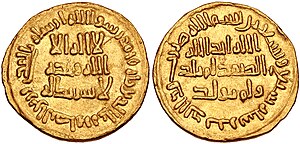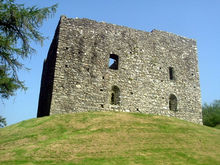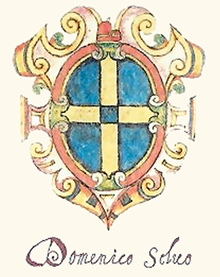Portal:History
The History Portal
History (derived from Ancient Greek ἱστορία (historía) 'inquiry; knowledge acquired by investigation') is the systematic study and documentation of the human past. History is an academic discipline which uses a narrative to describe, examine, question, and analyze past events, and investigate their patterns of cause and effect. Historians debate which narrative best explains an event, as well as the significance of different causes and effects. Historians debate the nature of history as an end in itself, and its usefulness in giving perspective on the problems of the present.
The period of events before the invention of writing systems is considered prehistory. "History" is an umbrella term comprising past events as well as the memory, discovery, collection, organization, presentation, and interpretation of these events. Historians seek knowledge of the past using historical sources such as written documents, oral accounts or traditional oral histories, art and material artifacts, and ecological markers.
Stories common to a particular culture, but not supported by external sources (such as the tales surrounding King Arthur), are usually classified as cultural heritage or legends. History differs from myth in that it is supported by verifiable evidence. However, ancient cultural influences have helped create variant interpretations of the nature of history, which have evolved over the centuries and continue to change today. The modern study of history is wide-ranging, and includes the study of specific regions and certain topical or thematic elements of historical investigation. History is taught as a part of primary and secondary education, and the academic study of history is a major discipline in universities.
Herodotus, a 5th-century BCE Greek historian, is often considered the "father of history", as one of the first historians in the Western tradition, though he has been criticized as the "father of lies". Along with his contemporary Thucydides, he helped form the foundations for the modern study of past events and societies. Their works continue to be read today, and the gap between the culture-focused Herodotus and the military-focused Thucydides remains a point of contention or approach in modern historical writing. In East Asia a state chronicle, the Spring and Autumn Annals, was reputed to date from as early as 722 BCE, though only 2nd-century BCE texts have survived. The title "father of history" has also been attributed, in their respective societies, to Sima Qian, Ibn Khaldun, and Kenneth Dike. (Full article...)
Featured picture
Did you know (auto generated)

- ... that the Picts disappeared from the historical record after the devastation suffered following the Battle of Dollar?
- ... that the Suwałki Gap is often described as the modern version of the Cold War–era Fulda Gap, a NATO vulnerability of historical importance?
- ... that Fernando Cajías, who belongs to the first generation of professional historians in Bolivia, composed part of history academia's "Mirista wing"?
- ... that Lucien Laurent scored the first goal in FIFA World Cup history during the inaugural game of Group 1 of the 1930 World Cup?
- ... that the entire inventory of historic string instruments in Canada's Musical Instrument Bank are loaned to musicians in a competition held every three years?
- ... that Mess L, a multipurpose building in Banjarbaru, Indonesia, was historically used to house Soviet workers?

Harriet Arbuthnot (née Fane; 10 September 1793 – 2 August 1834) was an early 19th-century English diarist, social observer and political hostess on behalf of the Tory party. During the 1820s she was the closest woman friend of the hero of Waterloo and British Prime Minister, the 1st Duke of Wellington. She maintained a long correspondence and association with the Duke, all of which she recorded in her diaries, which are consequently extensively used in all authoritative biographies of the Duke of Wellington.
Born into the periphery of the British aristocracy, her parents were Henry Fane and his wife, Anne, née Batson; she married a politician and member of the establishment, Charles Arbuthnot. Thus well connected, she was perfectly placed to meet many of the key figures of the Regency and late Napoleonic eras. Recording meetings and conversations often verbatim, she has today become the "Mrs. Arbuthnot" quoted in many biographies and histories of the era. Her observations and memories of life within the British establishment are not confined to individuals but document politics, great events and daily life with an equal attention to detail, providing historians with a clear picture of the events described. Her diaries were themselves finally published in 1950 as The Journal of Mrs Arbuthnot. (Full article...)
On this day

- 534 – The second edition of the Code of Justinian, a codification of Roman law by Byzantine emperor Justinian I (pictured), was published.
- 1532 – Spanish conquest of Peru: Conquistador Francisco Pizarro orchestrated a surprise attack in Cajamarca, capturing the Inca emperor, Atahualpa.
- 1914 – World War I: Austro-Hungarian forces launched an assault against Serbian defensive positions at the Kolubara river, beginning the Battle of Kolubara.
- 1944 – World War II: Operation Queen commenced with one of the heaviest Allied tactical bombings of the war, attacking German targets in the Rur valley.
- 1959 – The Sound of Music, a musical by Rodgers and Hammerstein based on The Story of the Trapp Family Singers, opened on Broadway at the Lunt-Fontanne Theatre.
- Kalākaua (b. 1836)
- Caroline Birley (b. 1851)
- Panditrao Agashe (d. 1986)
- A. S. Byatt (d. 2023)
Selected quote
Time's glory is to command contending kings,
To unmask falsehood, and bring truth to light.— William Shakespeare, playwright
Related portals
More Did you know...
- ... that Giovanni de Ventura, a plague doctor who may have worn a beak doctor costume (pictured), was restricted by a covenant to treat only infectious patients? In the nose of the mask, there were types of plants that were used to filter the sickness from the wearer.
- ... that in some archaic Greek alphabets, an Ε could look like a Β, a Β like a C, a Γ like an Ι, an Ι like a Σ, or a Σ like an Μ?
- ... that the Chinese government has published a list of sixty-four important cultural relics that are forbidden to be exhibited outside of China?
- ... that the 1886 novel Albertine expedited the abolition of public prostitution in Norway?
- ... that Carl Sagan worked with the US Air Force on detonating a nuclear device on the Moon?
- ... that Olympic gold medals have been made out of silver, jade, and glass?
- ... that in 1945 a Japanese battalion was rearmed to serve alongside the British 5th Parachute Brigade in the Far East?
- ... that Solomon was accidentally castrated as an infant?
Topics
Categories

History • By period • By region • By topic • By ethnic group • Historiography • Archaeology • Books • Maps • Images • Magazines • Organizations • Fictional • Museums • Pseudohistory • Stubs • Timelines • Chronology • People • Wikipedia historians
WikiProjects
![]() WikiProject History •
Ancient Near East • Australian History • Classical Greece and Rome • Dacia • Former countries • History of Canada • Chinese history • European history • Heraldry and vexillology • Indian history • Jewish history • Medieval Scotland • Mesoamerica • Military history • Middle Ages • History of Science
WikiProject History •
Ancient Near East • Australian History • Classical Greece and Rome • Dacia • Former countries • History of Canada • Chinese history • European history • Heraldry and vexillology • Indian history • Jewish history • Medieval Scotland • Mesoamerica • Military history • Middle Ages • History of Science
WikiProject Time • Days of the Year • Years
WikiProject Biography • Composers • Political figures • Saints • United States Presidents
Things you can do
 |
Here are some tasks awaiting attention:
|
Associated Wikimedia
The following Wikimedia Foundation sister projects provide more on this subject:
-
Commons
Free media repository -
Wikibooks
Free textbooks and manuals -
Wikidata
Free knowledge base -
Wikinews
Free-content news -
Wikiquote
Collection of quotations -
Wikisource
Free-content library -
Wikiversity
Free learning tools -
Wiktionary
Dictionary and thesaurus























































